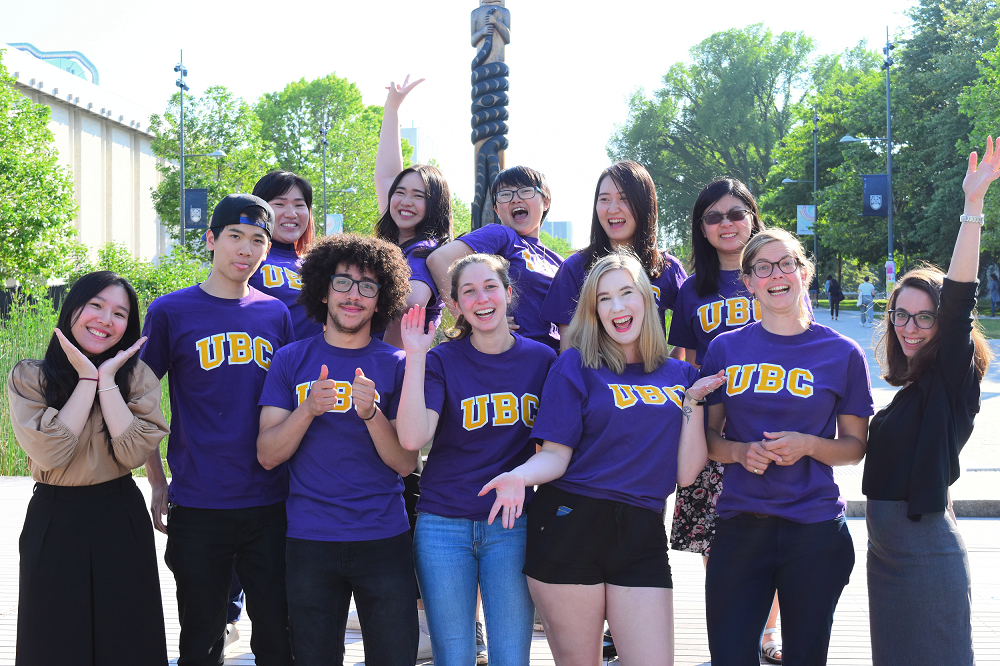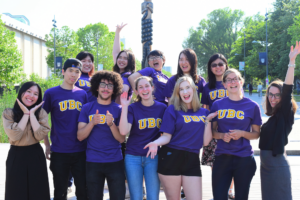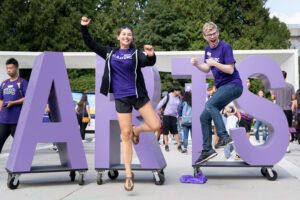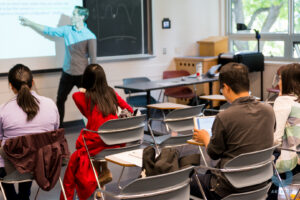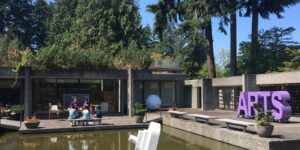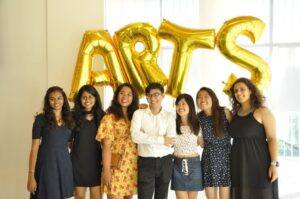Arts VSP is ideal for students interested in gaining international experience, meeting students from other universities and experiencing Canadian culture, while enhancing their learning experiences in one of the world’s top ranked universities. Students will enjoy university residence life and will have the opportunity to take part in events and field trips organized specifically for Arts VSP students.
What you might expect/course format
A typical course includes an interactive lecture and discussion component and will have a mix of in-class and take-home assignments. Assignments can also include individual or group projects, quizzes, and exams.
Some courses will offer academic field trips that take place on or off campus. These field trips complement classroom learning, and may include community engagement or fieldwork.
The Arts Vancouver Summer Program’s instructors and teaching assistants are committed to providing a supportive learning environment for students. During the program, instructors provide support in class and by email.
July 2026 Course Packages
From Drama to Theatre: How does a play mean? (Theatre)
This course will explore the languages of theatre within Vancouver’s rich and lively performance culture. How do individual artists–directors, actors, designers–transform a playwright’s ideas into unique and original art? In what ways, for example, will a Shakespeare play produced in Vancouver become a Canadian play? These questions and more will be explored in relation to two plays a week in production in Vancouver during the term. We will examine and discuss the play scripts, attend the plays, and meet “backstage” with some of the artists themselves. Plays chosen will span a variety of genres, including Shakespeare (in production at Bard on the Beach Shakespeare Festival), musicals (in production at Theatre Under the Stars and the Arts Club Theatre Company), plus additional dramas and comedies in production.
Documentary & the City (Film)
For the first time in human history a majority of the world live in cities. While there are multiple threats posed by the growth of cities, such as poverty, migration, and social divisions, there are also surprising and innovative practices that emerge. The city of Vancouver is brimming with stories that can tell us many things about the world we live in. Focusing on documentary films and film making, this course introduces students to these often hidden stories of the city through key writings, films, and direct engagement with life in Vancouver. Students will use creative methods to connect critical analysis with their everyday experiences, while authoring basic documentary projects in neighbourhoods throughout the city.
Prerequisites: No prerequisites
Minors (students aged under 19 at the start of the program): Not accepted
Culture and Communication
This introductory course provides an anthropological perspective on how language, as a common human condition, shapes social life. In exploring the intertwined relationship between language and culture, the class will introduce the foundational concepts and methods used in anthropology to study patterns of communication and socio-cultural practices in a global context. Language is a substantial force in formulating cultural beliefs, ideologies, categories of social identity, community memberships, and power relations. Through a combinaton of lectures, group discussions, solo and team projects, and guest speakers, students will be well-equipped to answer questions such as: What is language and how does it shape our social worlds? How can linguistic theories help us grasp cultural phenomena? How do people use language to form their identities? And how do various societal factors influence intercultural communication? Students will gain an understanding of the relationship of language to their own and other cultural contexts.
Global Journalism
This course will examine the development of media technologies, their applications, and their cultural, political and social impacts. Students will also gain hands-on experience in learning how to think and operate like a professional journalist in a simulated multimedia environment, such as engaging with other students on campus and the local area. It is designed to introduce students to the grammar and syntax of media across platforms, based on a core journalistic skill set of interviewing, reporting, news writing, and research methods in solo and team projects that are tandem with the most current technical tools and technologies in digital media.
Prerequisites: No prerequisites
Minors (students aged under 19 at the start of the program): Not Accepted
International Trade and Financial Markets
This course will give students an understanding of the structure and functions of international trade and international financial markets as well as a basic introduction to the forces driving international trade in goods and financial assets among nations of the world. We will review the major theories of international trade and financial markets. Topics covered will include the determinants of a country’s trading patterns, recent trends in international trade such as offshoring and global supply chains, the role of financial markets in international development, the future of the Renminbi as an international currency, the understanding of international financial crises, and sovereign debt crises.
Global Economic Growth: From Ancient Civilizations to the Industrial Revolution
Why do some societies struggle while others prosper? For millennia, most people around the world barely earned enough to survive. Starting in the eighteenth century, several countries broke this pattern, allowing a large and increasing fraction of the world’s population to enjoy higher standards of living. This course is an attempt to answer the enduring question “What sparks and sustains economic growth?
We will look as far back as the Neolithic Revolution in search of the institutional, geographical, and cultural roots of the global growth experience and explore why Europe was the region where the Industrial Revolution first took place, and what prevented other promising attempts from coming to fruition. Students will contrast different interpretations and critically analyze the advantages and shortcomings of each approach in a quest to understand how the history of global development can help unlock the pressing economic challenges of our age.
Prerequisites: No prerequisites
Ordering Chaos: Global Order and AI Governance
The Global Economic Order is fraying. AI is challenging all political institutions. What is driving this change? And what are pathways for dealing with this once-a-century transformation?
The course explores how the global system really works and how rules are made to regulate trade, deal with economic security, protect the environment, and enforce labour standards. What are key institutions and what has made globalization possible? And what threatens this order? The course unpacks the dilemmas involved in the digital and AI revolutions and compares the regulatory approaches taken by different countries.
The course also explores possible pathways and sources of innovation, entrepreneurship, and hope.
Governing The Planet: Climate, Green Technology, and the Future of Humanity
Please note that the course description of this course has been revised on February 3, 2026.
Why do some societies struggle while others prosper? For several millennia, most people around the world barely earned enough to survive. Starting in the eighteenth century, however, several countries broke this pattern, allowing a large and increasing fraction of the world’s population to enjoy higher standards of living. This course is an attempt to answer the enduring question “What sparks and sustains economic growth?”
We will explore why Europe was the region where the Industrial Revolution first took place, and what prevented other promising attempts from coming to fruition. We will look as far back as the Neolithic Revolution in search for the institutional, geographical, and cultural roots of the global growth experience. Students will contrast different interpretations and critically analyze the advantages and shortcomings of each approach, in a quest to understand how the history of global development can help unlock the pressing economic challenges of our age.
Throughout the course, you will be introduced to several tools needed to analyze historical events in the light of economic insights. We will employ critical thinking throughout, contrasting different interpretations and analyzing the advantages and shortcomings of each of them.
Prerequisites: No prerequisites
Minors (students aged under 19 at the start of the program): Not Accepted
Writing for Video Games
Embark on a journey into the exciting world of video game writing—an innovative frontier where storytellers and developers are constantly pushing boundaries and redefining narrative possibilities.
In this course, students will discover what it means to be a narrative designer in this highly collaborative, constantly changing field. Through a combination of lectures, hands-on demonstrations, presentations from leading game writers, reading assignments, in-class writing exercises, and assigned projects, students will learn how to create their own video game story through cutscenes, voiceover dialogue, in-game text, found narrative, and other techniques.
No previous experience with games or game-writing is necessary.
Creativity for Social Justice
Social justice, equality, diversity, decolonization, indigenization, and inclusion are the buzzwords of the 21st century. This course examines what these terms really mean and how we make them come to life when we employ and apply these in creative-critical writing, research and public engagement.
Students will examine, analyze and undertake critical engagement with creative processes of marginalized peoples and the intersection of creative writing, social justice, and anti-racist feminism by engaging with assigned readings and their own life experience. This course builds on how socio-historical contexts are crucial to acts of creative writing, teaching, research and engagement with multiple publics both locally and globally. Students will embark on field trips within Metro Vancouver’s creative cultural spaces as a part of their learning journey.
Prerequisites: No prerequisites
Happiness and Philosophy
Happiness seems to be a universal goal. But what is happiness? Is happiness something you can reliably obtain through some plan of action? And is happiness truly a worthwhile goal? Happiness is a bit like the Sun: it is vital, but hard to look at directly. In this course, we will study contemporary and classical philosophical writings, drawing from different traditions and perspectives, as well as some contemporary videos (including some critiques of happiness). The course will also look at the nature of happiness and ways to cultivate it with help from related fields such as psychology, economics, neuroscience, political theory, and sociology. Students will be encouraged to experiment on themselves through activities that try out different ways of thinking about happiness, to analyze both the philosophical literature and their own perceptions, and then to put some of these ideas into practice.
Philosophy in and for Tough Times
We’re living in tough times: from climate change to pandemics, from uncontrolled AI to the threats of global war and spreading authoritarianism. People today are routinely required to adapt to rapid change and cope with great uncertainty about the future. But people (and philosophers) have been in tough times before, and many philosophers have written great works when confronting crises like plagues, wars, and holocausts. This course will consider some contemporary crises (such as climate change and ecological destruction) and look at what philosophy tells us about how people can respond productively to them. But mainly we’ll study past philosophers such as the Stoic Marcus Aurelius, the Taoist Zhuangzi, the existentialist Albert Camus, and the psychologist and Holocaust survivor Viktor Frankl, to seek guidance and practices for dealing with tough times we can’t change. Instruction will combine texts, videos, lectures and visits to local sites of reflection and resistance.
Prerequisites: No prerequisites
Minors (students aged under 19 at the start of the program): Not Accepted
Asian Canadian Experiences in Metro Vancouver
As a gateway for the Pacific Rim and arguably the most Asian city in North America, Vancouver is known as a highly-desirable destination for migrants from Asia. But what has this actually meant for Asian Canadian people? This course provides students with an overview of the historic and contemporary experiences of Asian Canadians in Metro Vancouvers. We will investigate migration patterns of different Asian groups from China, Japan, India and more, as well as characteristics of these diasporic settlements in Metro Vancouver. Drawing on disciplines such as sociology, ethnic studies, cultural studies, policy studies, history, community development, and media studies, we will focus on how Asian migration and lives have been shaped by Canadian, provincial, and local laws, and the region itself. In addition to lectures, group discussions, and guest speaker visits, we will go to Vancouver’s historic Chinatown, the Nikkei National Museum & Cultural Centre, the Punjabi Market, Steveston, Richmond Night Market, and the Museum of Vancouver.
Metro Vancouver as Asian Canadian History
While Metro Vancouver has shaped the experiences of Asian Canadians, Asian Canadian people have also shaped and made the city itself. This course explores the role of Asian Canadian histories in Vancouver, stories, of oppression, resilience, and community, what they reveal about the city, and why they matters. This course explores diverse narratives from a number of Asian communities in Metro Vancouver, considering what they reveal about Canadian multiculturalism, colonialism on unceded Indigenous lands, and the extraordinary diversity within the categories of “Asian” or “Asian Canadian.” Students will also focus on how these histories are told in public today, immersing themselves in local museums, walking tours, podcasts, archives, film, and media. History is so much more than just facts about what happened; it is a way of exploring the city and understanding the importance of Asian Canadian people here, past and present.
Prerequisites: No prerequisites
Minors (students aged under 19 at the start of the program): Not Accepted
Making Books, Making Media, Making Publics
Considers the emergence and evolution of “(the) public(s),” as an assemblage of readers, audiences, and citizens, in Anglo-American politics, from the turn of the eighteenth century to the present. Students will read short excerpts from works of political philosophy, literary history, journalism, and poetry that examine and engage the significance, nature, and history of publics. Students will investigate scholarly claims about the relationship between writing, reading, books, media and the empowerment of citizens by learning, engaging in, and critically reflecting on practices of media making: the design, typsetting and printing, illustration and binding of a text of their own making, in analogue and digital modes.
History of the English Language
In this course we trace the development of the English language from an unimportant local dialect on the outskirts of the European settlement area to a vibrant global language that has diversified into numerous independent standards today. We will explore the various forms of the language as it has been adapted to fit changing needs, from its Proto-Indo-European origins, to the coming of the language to the British Isles, its near obliteration in Middle English times and its comeback in the Renaissance period. We will focus on the language’s role in the following colonial paradigm and reflect on what makes Canadian English today. In other words, we’re dealing with 5000 years of language history, 1500 under the name “English”, to explain how we got where we are today.
Prerequisites: No prerequisites
For more information
For VSP Arts-specific questions, email Emily Chou, International Summer Program Coordinator, at arts.vsp@ubc.ca.
Student testimonials
– Ethan, VSP Arts Student
– Tongfong, VSP Arts Student, 2018
